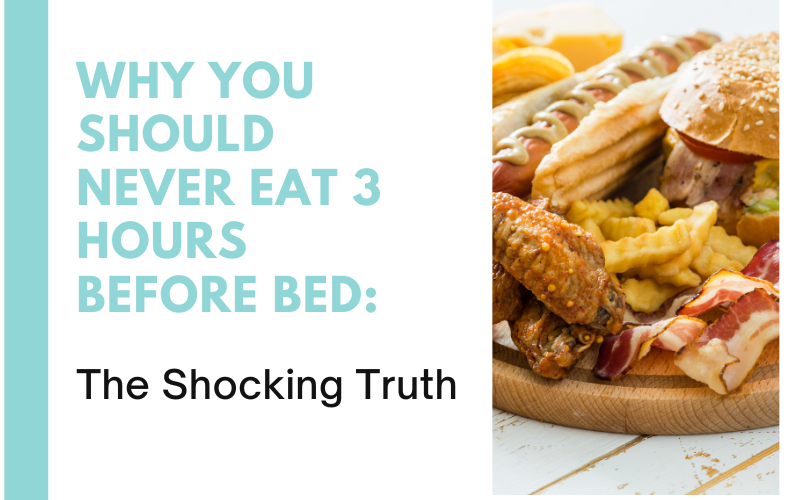Why you should never eat 3 hours before bed has become one of the most debated topics in health and wellness circles, and the scientific evidence behind this recommendation is more compelling than you might imagine. This seemingly simple rule could be the key to unlocking better sleep, improved metabolism, enhanced beauty, and optimal health that you’ve been searching for all along.
Most people dismiss late-night eating as a minor habit, but research reveals that your evening food choices and timing can dramatically impact everything from your weight and skin health to your energy levels and longevity. Understanding the profound effects of eating close to bedtime will revolutionize how you approach your evening routine.
The Science Behind the 3-Hour Rule
The reason why you should never eat 3 hours before bed lies in your body’s natural circadian rhythms and metabolic processes. Your digestive system follows a predictable cycle that’s designed to slow down as your body prepares for rest and repair mode during sleep.
When you eat within three hours of bedtime, you’re essentially forcing your body to multitask between digestion and sleep preparation – two processes that compete for energy and resources. This conflict creates a cascade of physiological disruptions that extend far beyond simple indigestion.
Your core body temperature naturally drops as bedtime approaches, signaling your brain to release melatonin and prepare for sleep. However, digesting food raises your internal temperature, disrupting this natural cooling process and interfering with your body’s ability to enter deep, restorative sleep phases.

One of the most immediate consequences of ignoring why you should never eat 3 hours before bed involves severely compromised sleep quality. When your digestive system remains active during sleep, it prevents your body from entering the deep sleep stages necessary for physical repair and mental restoration.
Studies show that people who eat within three hours of bedtime experience:
- 23% more sleep interruptions throughout the night
- Reduced REM sleep by up to 30%
- Increased sleep onset time (taking longer to fall asleep)
- More frequent nighttime awakenings
- Lower overall sleep satisfaction scores
Poor sleep quality creates a vicious cycle because sleep deprivation increases hunger hormones (ghrelin) while decreasing satiety hormones (leptin), making you more likely to overeat the following day.

Understanding why you should never eat 3 hours before bed becomes critical when you consider the metabolic consequences of late-night eating. Your metabolism naturally slows down in the evening as your body prepares for the overnight fasting period that occurs during sleep.
When you eat close to bedtime, you’re consuming calories at a time when your body is least equipped to process them efficiently. This mistiming leads to:
Insulin Resistance Development: Late-night eating consistently elevates blood sugar when insulin sensitivity is naturally at its lowest, contributing to metabolic dysfunction over time.
Fat Storage Acceleration: Calories consumed before bed are more likely to be stored as fat rather than used for energy, particularly around the midsection.
Disrupted Fat Burning: Your body typically burns stored fat during the overnight fasting period, but late eating interrupts this natural fat-burning process.

The cosmetic reasons why you should never eat 3 hours before bed extend far beyond weight management to include significant impacts on your skin health and overall appearance. Poor sleep quality directly affects your skin’s ability to repair and regenerate overnight.
During deep sleep, your body increases growth hormone production, which stimulates cellular repair and collagen synthesis. When late-night eating disrupts these sleep stages, you miss out on crucial beauty benefits:
- Reduced collagen production leading to premature aging
- Increased inflammation that manifests as skin breakouts
- Poor skin barrier function resulting in dullness and dehydration
- Accelerated formation of fine lines and wrinkles
- Uneven skin tone and texture
Additionally, the inflammation caused by late-night eating can trigger stress hormones that break down existing collagen and elastin, literally aging your skin from the inside out.

Another compelling reason why you should never eat 3 hours before bed involves protecting your digestive health and preventing uncomfortable symptoms that can plague your daily life. Your digestive system needs time to process food completely before you lie down.
When you eat and immediately go to bed, gravity can no longer assist in moving food through your digestive tract. This can lead to:
Acid Reflux and Heartburn: Lying flat after eating allows stomach acid to travel up into the esophagus, causing painful burning sensations.
Bloating and Discomfort: Incomplete digestion can cause gas buildup and abdominal distension that interferes with comfortable sleep.
Irregular Bowel Movements: Disrupting your digestive rhythm can lead to constipation or other elimination issues.

The weight management aspect of why you should never eat 3 hours before bed represents one of the most significant long-term health considerations. Multiple studies have established strong correlations between late-night eating patterns and weight gain.
Research published in the American Journal of Clinical Nutrition found that people who ate after 8 PM consumed an average of 248 more daily calories than those who stopped eating earlier. More importantly, these extra calories were more likely to be stored as fat due to the timing of consumption.
Late-night eaters also tend to make poorer food choices, gravitating toward high-calorie, processed foods that provide quick energy but little nutritional value. This combination of poor timing and food quality creates a perfect storm for weight gain.

The hormonal reasons why you should never eat 3 hours before bed affect virtually every aspect of your health and well-being. Late-night eating disrupts several crucial hormone cycles that regulate everything from hunger to stress response.
Growth Hormone Production: This anti-aging hormone is primarily released during deep sleep phases. Late eating can reduce growth hormone production by up to 70%, accelerating aging and reducing muscle recovery.
Cortisol Regulation: Eating before bed can cause cortisol spikes when levels should naturally be declining, leading to chronic stress responses.
Insulin Function: Nighttime insulin resistance can develop from consistently eating before bed, increasing diabetes risk.
Mental Health and Cognitive Impact
The psychological reasons why you should never eat 3 hours before bed extend to mental health and cognitive function. Poor sleep quality from late eating affects neurotransmitter production and brain function.
Sleep-deprived individuals show increased activity in brain regions associated with reward-seeking behavior, making them more likely to crave high-calorie foods. This creates a cycle where late eating leads to poor sleep, which increases cravings for more late-night eating.
Practical Implementation Strategy
Now that you understand why you should never eat 3 hours before bed, implementing this rule requires strategic planning to ensure success without feeling deprived.
Start by calculating your typical bedtime and working backward to establish your eating cutoff time. If you normally sleep at 11 PM, stop eating by 8 PM. Gradually adjust your dinner timing and portion sizes to feel satisfied without late-night hunger.
Emergency Strategies for Late Hunger
Even when you understand why you should never eat 3 hours before bed, occasional late hunger may occur. If you must eat something, choose small portions of easily digestible foods like herbal tea, a few almonds, or a small piece of fruit.
Conclusion
The evidence supporting why you should never eat 3 hours before bed spans multiple aspects of health, from sleep quality and metabolism to beauty and mental well-being. This simple rule can transform your health by allowing your body to follow its natural rhythms and optimize overnight repair processes.
By respecting your body’s need for proper digestion timing, you’ll experience better sleep, improved metabolism, enhanced beauty benefits, and overall superior health outcomes. The three-hour rule isn’t just a dietary guideline – it’s a cornerstone of optimal wellness that can revolutionize your daily energy and long-term health trajectory.





Pingback: 7 Shocking Foods That Destroy Your Sleep Quality (You Eat Them Daily) - Lady Vibe Style